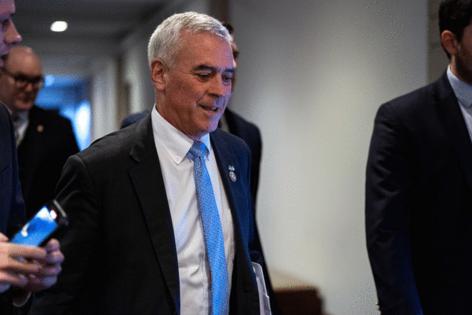Life after Congress: Wenstrup's return to Ohio brings journey full circle
Published in Political News
WASHINGTON — More than many lawmakers, former Rep. Brad Wenstrup was well positioned to make an easy transition from Congress back to “civilian” life.
For one thing, he still keeps a foot in Washington, visiting roughly once a month and crashing on a couch in the same house where he used to live with a handful of fellow Republican lawmakers.
For another, he’s used to big, seismic transitions: First he was a foot surgeon who owned a small business. Then he was an Army reservist, serving as a surgeon at Abu Ghraib prison in Iraq. Then he was a congressman representing Ohio’s 2nd District.
Now, he’s a small businessman again, this time a consultant.
“I’ve kind of gone full circle,” he said.
If there’s one theme to his adult life, in fact, it seems to be navigating change.
Wenstrup was on his fourth date with his future wife, Monica, when he told her he might run for Congress. They married right after he won the primary and became parents to both of their children while he served in the House.
For years, their family life meant a perpetual suitcase in the hallway, with Wenstrup coming home on weekends and spending the workweek in Washington.
Now, he said, that’s changed.
“We have one little closet full of suitcases,” he said. “And mine’s finally in there.”
A prolonged recess
Wenstrup, 67, was elected from his Cincinnati-area district in 2012 and served six terms before retiring in January.
The move home, he said, was celebratory; it felt like a prolonged recess.
“It’s like, ‘Of course I can take the kids to school. Yeah, I can take him to his practice, their game. Oh, I’m coaching his basketball team,’” he said. “You find these things that keep you busy that are related to the family.”
But he hasn’t bid a total adieu to his previous life. Wenstrup’s consulting firm, Ubiquitous Strategies Alliance, delves into many of the same issues he worked on in Congress, including health care and defense. He also now serves on President Donald Trump’s Intelligence Advisory Board, which requires some travel to D.C.
Both of those things, he said, made the transition easier.
“You know, when they get back in session — new Congress, all that — you’re feeling a little left out of things, right?” he said. “Well, then I started getting consulting jobs, and that’s been very good.”
During his last few years in Congress, he lived with roommates, in a group house whose residents over the years have included Majority Leader Steve Scalise, R-La., as well as Republican Reps. Jake Ellzey of Texas and Pete Stauber of Minnesota and former GOP Reps. Kevin Brady of Texas, Erik Paulsen of Minnesota and John Shimkus of Illinois. “It’s guys that get along,” Wenstrup said.
And guys that have literally had each others’ backs. In June 2017, when Scalise was shot in Alexandria, Va., during a mass shooting at a baseball practice for the Congressional Baseball Game, Wenstrup was the first to treat his wounds.
The two became housemates a few years after that incident. They’re still close today.
“We’ve got a group text,” he said. “I know what they’re doing, and I hear, like, ‘I’m not getting back till 2 a.m. because we’ve got the markup tonight.’”
Early years
During his first few years in Congress, though, he lived in D.C. with his wife, a financial consultant who could work remotely, and their firstborn. The family first lived in a studio, then in a basement apartment on Third Street with radiators in the ceiling and a big enough walk-in closet for their boy to have a bedroom. “One weekend, we caught 30 roaches,” he recalls ruefully.
Eventually, they bought a townhouse on East Capitol Street, renting out basement space to Senate staffers.
When their son hit first grade, they decided it was time to bring him back to Cincinnati, where he could be closer to extended family.
Wenstrup kept the townhouse at first. Rep. Andy Barr, R-Ky., moved in for a while after his first wife passed away. But eventually, Wenstrup sold the house, opting to live in his Capitol Hill office until Scalise invited him to move into the lawmakers’ townhouse.
That arrangement worked for about four years, but in 2024, Wenstrup, who had had a waiver allowing him to serve on Intelligence and Ways and Means and who also was chairing the Select Subcommittee on the Coronavirus Pandemic, knew he wouldn’t be able to do all those things if he ran again.
And then there was this: His daughter, then 6, asking him, “When will I see you again?” Or saying he’d be home on Thursday night, only to have his son, who will be 12 in November, respond, “OK, but I’ll still miss you.”
“And it was like, ‘It’s time,’” Wenstrup said.
Now, he’s with his family more than he’s not. It’s been a good transition. His wife has a pretty busy schedule, so he hasn’t been underfoot. He says good night prayers with his kids most nights. And for the first time in more than a decade splitting time between D.C. and Ohio, Wenstrup wakes up each morning “and I know where I am.”
“I got to do so many things that I never planned on,” Wenstrup said. “I knew I wanted to be a doctor. But I didn’t know I’d be a soldier, I didn’t know I’d go to war, I didn’t know I’d be in Congress, and I didn’t know that serving in Congress would make me wanted by others for advice and things like that.
“I went out on my own terms. And I think that makes the transition easier.”
©2025 CQ-Roll Call, Inc., All Rights Reserved. Visit cqrollcall.com. Distributed by Tribune Content Agency, LLC.
























































Comments